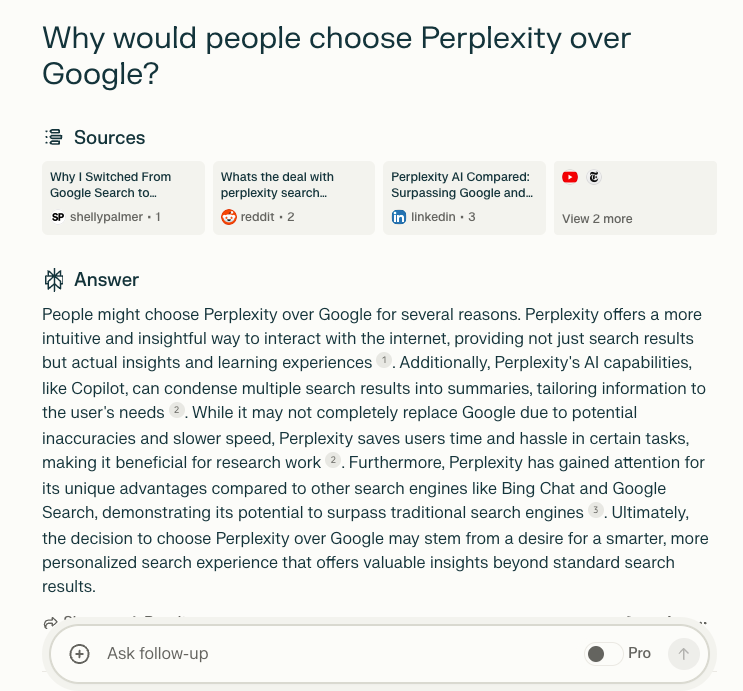Perplexity ❤️ Google, SGE Coming Soon?, Antitrust Conundrum

Can Perplexity Succeed Where Others Failed?
When OpenAI launched in 2022, many perceived an existential threat to Google. Bing quickly integrated AI chat into its search results and a host of smaller companies promised to redefine the way we discover and process online content. So far that hasn't happened – although my own Google usage is down by ~50% – but you can't escape the thought that, eventually, AI will radically change "search." Google is trying to elegantly manage the transition without undermining revenues. If it succeeds it will have defied "the innovator's dilemma." One of Google's smaller, AI-fueled competitors was Neeva. Founded by former Googler Sridhar Ramaswamy, the company was acquired and shut down last year. (Ramaswamy is now CEO of Snowflake, which bought it.) Neeva then said, "Convincing users to pay for a better experience was actually a less difficult problem compared to getting them to try a new search engine in the first place." Perplexity is now following in Neeva's footsteps and making a direct run at Google, sometimes with Google's own rankings. It also recently integrated Yelp data to boost local results. Perplexity aims to compete by delivering "instant, reliable answers," without the need "to click on different links ... or endlessly dig for information."

Our take:
- Perplexity is right about the UX, many people are fatigued by the Google SERP. That's partly why brand results win.
- Perplexity's model, right now, is paid subscriptions. That would potentially change over time, but the absence of ads is currently an advantage.
- It's unlikely that any one site will eat meaningfully into Google's share. But collectively they could peel off several points of usage.
Does Liz Reid Mean SGE Is Coming Soon?
Google's new Search VP Liz Reid got her start in Local. "I joined Google in 2003 as one of the first engineers building Google Local, which laid the foundation for the local information you find in Google Search and Maps today," she says in a LinkedIn post. More recently she's been one of the executives leading the integration of AI into search, one example of which is Google's Search Generative Experience (SGE). A few months ago Google declined to fully roll out SGE, as was originally expected. That caused many people, including us, to speculate that SGE would probably not roll out at all, at least in current form. Having held off BingGPT and OpenAI itself, Google seemed to no longer be under immediate competitive threat. Thus it could piecemeal selected SGE features to users over time. But, given Reid's appointment, some are now speculating that the AI future of Google Search looks a lot like SGE – "trading links for answers" – and is a lot closer than we think.
Our take:
- Publishers are quite concerned about the impact of SGE-like experiences in Google SERPs on referrals. That fear is probably justified, although Google is mindful of the dilemma they face.
- Google's results are cluttered and search quality has declined. Beyond competition those factors also put pressure on the company to evolve.
- There's no question that AI will have a dramatic impact (over the next 5 years) on "search." But SEO will also evolve with it.
The Antitrust Conundrum
As you're aware, Apple is now more directly in the antitrust cross-hairs, both in Europe and the US. Though not its first brush with antitrust litigation, the US Justice Department, and multiple state attorneys general, have just sued Apple for seeking, in multiple ways, to erect barriers to competition: "Apple undermines apps, products, and services that would otherwise make users less reliant on the iPhone, promote interoperability, and lower costs for consumers and developers." The central idea is that Apple keeps an iron grip on its ecosystem to maintain market share and grow revenues – in other words: a moat. The complaint and its claims do have merit. Apple counters that a government victory would get it into the business of designing technology experiences and prevent the kind of beneficial hardware-software integrations that consumers fundamentally want. Google has made similar arguments around the design of its search results (e.g., integration of Maps into the SERP). Indeed, some European users seem to be complaining about the loss of some functionality in the post-DMA Google SERP. So is this a case of governments opposing user interests and the market?

Our take:
- The government is seeking broad but unspecific remedies against Apple. Some things (like interoperability) are more feasible than others. Apple argues, some remedies would degrade user experiences.
- Nobody disputes the value of competition. However, Apple and Google do dispute that they're anti-competitive monopolies. They argue they've won with better products – and have plenty of competition.
- Consumers made choices in the past that arguably have created fewer choices in the present. Google won in search and usage is now habitual, though that could eventually change.
Short Takes
- Moz: 14 Local Search developments from Q1 2024.
- Review recency is a local ranking factor.
- New Google Local spam scheme makes competitors invisible.
- Uber "unable" to remove Uber Eats links in GBPs.
- Yelp: Google SERP changes not DMA compliant.
- Semrush Copilot: AI-assistant offers SEO recommendations.
- Messy behind-the-scenes story of a local marketplace's expansion.
- Microsoft paid $650 million for Inflection "acquihire," licensing.
- Google fined €250M for AI training data copyright violations.
- OpenAI's GPT Store is full of suspect bots and spam.
- EU: Meta's new anti-tracking consumer fee probably illegal.
- Too much Schema counterproductive and could hurt results.
- TikTok ban slows down as it moves into the US Senate.
Listen to our latest podcast.

How can we make this better? Email us with suggestions and recommendations.

